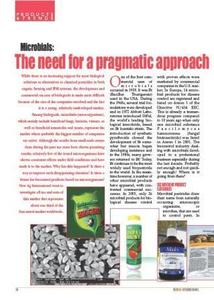Europe
November 5, 2010
 The work of ENDURE’s team dedicated to biological controls features in the latest edition of New Ag International, the journal dedicated to high-tech agriculture. New Ag carries a nine-page feature examining the market for microbials, those microorganisms such as beneficial fungi, bacteria, viruses, nematodes and yeasts, which represent around one-third of the global biocontrol market.
The work of ENDURE’s team dedicated to biological controls features in the latest edition of New Ag International, the journal dedicated to high-tech agriculture. New Ag carries a nine-page feature examining the market for microbials, those microorganisms such as beneficial fungi, bacteria, viruses, nematodes and yeasts, which represent around one-third of the global biocontrol market.
The journal praises the ‘remarkable’ study produced by ENDURE researchers earlier this year which sought to better understand the role biological controls can play in crop protection, alongside the factors that influence their success or failure, and the economics of a sector that faces challenges rather different to those of the chemical industry. You can read more about this report by clicking here.
ENDURE’s 234-page report, Review of factors influencing the success or failure of biocontrol and recommended orientation for new R&D projects , included not only a review of recent scientific research on biocontrols, but a survey of farmers and biocontrol retailers, and a detailed look at the costs involved in producing a microbial biocontrol agent.
New Ag focuses on the economic aspects of the ENDURE study, which showed that producing a microbial biocontrol agent (MBCA) can be more than twice as expensive as producing an equivalent chemical pesticide because of the complicated and expensive production process required. Furthermore, there is a smaller potential market for MBCAs, which are very specific in their action, and so bringing an MBCA to the market is much less effective (financially) than a chemical equivalent.
The New Ag report also features the work coordinated by Jürgen Köhl, of Wageningen’s Plant Research International in The Netherlands, which explores better screening of microorganisms for commercial use (more details of this work will be available later this year).
- Read the report from New Ag International:
For more information